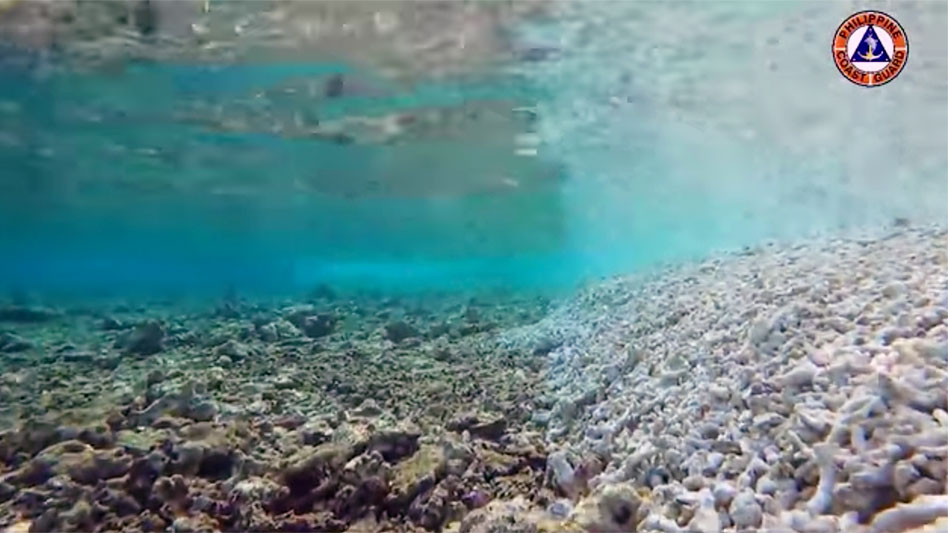Philippine Senate told to probe coral reef destruction; China asked to pay

A PHILIPPINE senator has filed a resolution seeking to investigate China’s alleged destruction of corals at Iroquois Reef and Sabina Shoal in the South China Sea.
Senator Ana Theresia “Risa” N. Hontiveros-Baraquel in Resolution 804 condemned the coral harvesting allegedly by Chinese militia vessels and urged the Senate to conduct an inquiry into the matter.
She also renewed her call for China to pay for environmental damages after the Philippine Coast Guard confirmed a military report on the destruction of corals at Iroquois Reef and Sabina Shoal.
The senator said the government should not tolerate the continuing harm to the environment, economy and security brought about by Chinese incursions, and should try to hold China accountable, including a claim for damages to be filed with the Permanent of Court of Arbitration in the Hague.
“We should seek payment for damages caused by China in the West Philippine Sea,” Ms. Hontiveros said in a statement, referring to areas of the South China Sea within the Philippines’ exclusive economic zone. “We will get billions of pesos once China is obligated to pay,” she said in Filipino.
She accused China of robbing Filipino fishermen of their livelihood and destroying Philippine natural resources.
The Chinese Embassy in Manila did not immediately reply to an e-mail seeking comment.
The Philippines should seek an international investigation of the alleged coral harvesting by Chinese maritime militia vessels in Philippine-claimed areas of the South China Sea, geopolitical analysts said on Tuesday.
The Philippines has put itself in a good position to internationalize the ecological destruction of its maritime features through its maritime transparency policy, said Raymond Powell, project leader at Stanford University’s Gordian Knot Center for National Security Innovation.
“The Philippines can now appeal directly to international and transnational groups to investigate these matters and request outside intervention,” he said in a Twitter message, referring to the United Nations, Greenpeace and World Wildlife Fund.
The Philippine Coast Guard (PCG) this week said it had conducted underwater surveys that showed “the marine ecosystem in the subject West Philippine Sea features appeared lifeless, with minimal to no signs of life.”
It said it had monitored 33 Chinese militia vessels near Iroquois Reef and 15 others near Sabina Shoal from Aug. 9 to Sept. 11. Iroquois Reef is at the southern end of Reed Bank, an area northeast of the Spratly Islands thought to be rich in oil and gas.
There was visible discoloration of the seabed, indicating activities meant to modify the terrain’s natural topography, it added.
‘DOGGED COMMITMENT’
The presence of crushed corals strongly indicates a potential act of dumping, “possibly involving the same dead corals that were previously processed and cleaned before being returned to the seabed,” it said.
The Philippine military on Sept. 14 raised concerns over the resurgence of China’s swarming tactics in Philippine areas of the disputed waterway.
Citing air patrols on Sept. 6 and 7, the Armed Forces of the Philippines Western Command said Iroquois Reef was being surrounded by 23 Chinese fishing vessels.
The tactic was also seen at Sabina Shoal, where five Chinese fishing vessels were present, and at Nares Bank, where two Chinese fishing vessels were spotted, it said in a statement.
The swarming activity has implications for the Philippines’ “maritime security, fisheries conservation, territorial integrity and the preservation of the maritime environment,” it added.
At the height of a coronavirus pandemic in 2020, Ms. Hontiveros filed Senate Resolution 369 calling on the Executive to exert legal and diplomatic efforts so that China would foot the bill for its COVID-19 response.
The call came after a scientist from the University of the Philippines’ Marine Science Institute estimated that the country was losing P33.1 billion yearly from the damaged reef ecosystems at Scarborough Shoal and the Spratly Islands due to China’s reclamation activities in the area.
The amount was determined using a baseline value of $353,429 (P20 million) per hectare per year for coral reefs based on a study conducted by Elsevier, a Dutch company specializing in scientific, technical and medical information and analytics.
“This will not be the first time for us to seek reparations,” Ms. Hontiveros said. “Japan paid our country for her destruction of Manila during World War II, and in more recent history, the United States of America also paid the Philippines P87 million after the USS Guardian damaged Tubbataha Reef in the Sulu Sea. We have the right to seek payment.”
“Our 2016 arbitral award clearly invalidated China’s sweeping and expansive claims in the West Philippine Sea,” Ms. Hontiveros said. “This is a case we won because of our dogged commitment to abide by international law and uphold the truth. It is only right that we pursue all options to make China pay.” — Norman P. Aquino and JVDO



